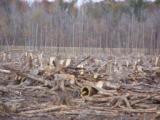|
| State Lines |
Groups Appeal Air Permit for Port Angeles, WA Biomass Power
July 21, 2011 No Biomass Burn and six other environmental groups are appealing the air permit decision by the Olympic Region Clean Air Agency (ORCAA), charging that the agency colluded with Nippon Paper
to grossly understate toxic pollution from a 20-megawatt biomass power
proposal under construction in Port Angeles, Washington.
Carcinogenic formaldehyde from Nippon's project would be emitted at rates nearly ninety times greater than ORCAA's permit shows, according to analysis conducted by a nationally renowned air quality engineer hired by the appellants.
Benzene,
also a carcinogen, would be emitted at levels six times greater than
reported levels, while VOC's (volatile organic compounds) would be
emitted in "substantially higher amounts" than the permit shows,
according to Badgley.
If allowed to stand, the lower pollution estimates would let Nippon avoid more rigorous government regulations and more expensive and effective pollution controls.
Lake Tahoe, California Biomass Power Proposal Relocated
August 4, 2011 The Tahoe Regional Planning Agency (TRPA)
rejected siting a 3-megawatt biomass power proposal on Lake Tahoe's
north shore in favor of a site a half mile off the western shore,
following opposition by local citizen groups.
"The grassroots effort was just one piece of the puzzle," said Dawn Baffone of The Lake Tahoe Anti-Biomass Plant Coalition, "but was a big factor in keeping the plant out of this residential area in Kings Beach."
An
environmental analysis revealed a "noise impact that cannot be
mitigated," at the original Kings Beach site, according to an August 9,
2011 letter from TRPA board chair, Norma Santiago.
The
new Cabin Creek site, which houses existing industrial operations,
including a recycling facility, is within the Mountain Counties Air
Basin, which is in non-attainment for federal clean air standards.
Friends of Lake Tahoe argues in a document
posted on its website that the air quality issue could be resolved by
reclassifying Cabin Creek as within the Eastern County Nevada Air Basin,
which is currently in attainment.
Biomass Power Developers Push Back in Springfield, Massachusetts
The
developers of a proposed 35-megawatt biomass power incinerator for
Springfield, Mass. have filed a lawsuit claiming the Springfield City
Council acted with "either bad faith or at least gross negligence" when
it voted 10-2 to revoke a special permit for building the facility in
May.
Palmer Renewable Energy
is asking the Land Court in Boston to annul the City Council permit
revocation, to award "costs," and to "grant such further relief as this
court deems just and proper."
The
City Council "carefully considered the issues and made sure they had
the legal basis for revoking the permit," said Springfield resident
Steve Dzubak. "I have confidence in them, and I have every confidence
that they will prevail in court as having exercised their rights and
responsibilities."
Shortly after the City Council decision, on July 1, the Massachusetts Department of Environmental Protection issued an Air Quality Permit for the proposed Springfield facility. |
| Our Health |
Pediatrician Worried About Biomass
Below are excerpts from a letter written by Norma Kreilein, MD,
Fellow of the American Academy of Pediatrics, in Jasper, Indiana in
response to "Toxic Power: How Power Plants Contaminate Our Air and
States," a recent report by Physicians for Social Responsibility and NRDC.
I
am writing as a concerned pediatrician in Southern Indiana. We live in
the heart of the power plant belt of the Midwest. For many years I
have suspected that our local pollution is greatly responsible for our
high rate of inflammatory processes, malignancies, and increasing rates
of autism.
For
the past several months I have been trying to fight the addition of a
biomass plant to our city. The city has long been an industrial base
with many wood factories, so there has apparently been a high VOC
[volatile organic compounds] load.
Strong
opposition was voiced from the time it was publicly mentioned, but the
city has pushed the plant through anyway. Much manipulation of emission
data has occurred (averaging emissions out over the whole county to
make them appear insignificant) but, ironically, one of the more
interesting arguments is that the plant, though polluting and within 1/2
mile of a residential neighborhood, should nonetheless be built because
the plant will decrease our dependence on coal fired plants.
Biomass
combustion is being sold to communities around the country by high
pressure, ambiguous, unscrupulous carpetbaggers who promise "jobs" and
"green energy" but are vacuuming precious federal funds to produce
expensive energy that will never solve our dependence on foreign oil nor
make our air any cleaner.
The
ultimate problem is that the same monitors and regulators that fail to
close down coal plants will do no better with biomass. We will just
spend more and think we feel better about it.
|
| Source Watch |
Whole trees, including trees from old-growth forests, are "renewable" energy, according to a ruling from the North Carolina Court of Appeals.
The ruling denied an appeal by the Environmental Defense Fund and Southern Environmental Law Center of a North Carolina Utilities Commission decision to allow Duke Energy to receive "renewable energy credits" for burning whole trees for electricity.
"Any
resource that can be considered a biomass [sic] because it is organic
and renewable is a biomass resource within the plain meaning of the
statute," ruled Judge Steelman. "All wood fuel meets these criteria and
thus is a 'biomass resource' and a 'renewable energy resource.'"
Clearcut outside of Green Swamp, N. Carolina (Photo: Abigail Singer) Biomass Energy Colonialism?
A
recent industry report says that imports of wood pellets into Europe
rose 40% between 2009 and 2010. August saw the formation of a
partnership between Enviva and Biomass Energy to supply
more than 350,000 tons of pellets and chips over the next three years
from a new facility in Virginia--their second in the state.
Enviva
also has facilities in Mississippi and North Carolina. To facilitate
exports, the company has purchased a deepwater port and is constructing a
storage silo in Virginia. Enviva also leases port space in Alabama.
Others are jumping on the pellet bandwagon. RWE Innogy
has constructed a massive pellet facility, capable of producing 750k
tons per year in Georgia, to provide pellets for their Tilbury power
station in UK, which plans to convert from burning coal to forest
pellets. Growing resistance to import-dependent facilities and policies
is evident, but much more is needed to stem the flow of pelletized
forests to European burners.
|
| Letter to the Editor |
Please send Letters to the Editor (150 words) to thebiomassmonitor [at] gmail.com. Dear Editor,
I
loved the piece on night solar electric generation in Spain ["Solar at
Night?', August 2011]. What they do in Spain, we can do in much of the
Southern US. Our household has been converted from compact
fluorescents to LEDs and we have realized an energy and money savings
with every electric bill. Reasonably-priced LEDs can be purchased on
eBay, at Lowe's and Sam's Clubs.
Innovation,
conservation and efficiency are possible now! We need not burn another
thing to produce electricity, especially our forests!
-Tom Kruzen
Mountain View, Missouri |
|
| From the Editor |
Rachel Smolker, Managing Editor
As
usual, summer flew by way too fast. The East Coast has just been
slammed by Hurricane Irene, while Texas and other southern states are
turning to dust under siege of drought. Just some of the nagging
reminders that global warming is rapidly gaining momentum.
The
halls of Congress may be inhabited by climate deniers and there may be
little expectation for international negotiations to be effective, but
local organizing remains red hot and the biomass battles going on across
the country are a great example. People are demanding real
solutions--not false accounting that pretends burning trees is "carbon
neutral, clean and green." The legal challenges going on around the
country--including the recently filed appeal against Nippon Paper's biomass power proposal in Port Angeles, Washington, are putting on the brakes on biomass and mobilizing resistance.
Travel
out to Washington State and you've got to be shocked and outraged by
the level of deforestation--largely flat out clearcutting, even on steep
slopes. The magnificent temperate rainforests--a planetary treasure
trove of biodiversity and carbon sequestration--are disappearing! Now
the biomass industry wants to escalate the cutting?
It
doesn't take a rocket scientist to understand that healthy living
growing forests are good for the climate and good for us--burning them
is not. Let's hope the coming year will see common sense "trickle up." |
 |
|
|
| Biomass Buster of the Month |
Duff Badgley - Washington Based
in Seattle, Duff has helped lead the charge against seven biomass power
facilities proposed for his beloved, forested state of Washington.
Duff
was a key organizer for the defeat of a 65-megawatt proposal for
Shelton, and is currently embroiled in three separate appeals against
biomass power proposals for Port Townshend, Longview, and Port Angeles,
among other efforts.
"Our
victories are many. Savor them. They are sweet and can give us the
strength to fight on," says Badgley. "I am buoyed by my comrades around
the country fighting in the trenches with me against biomass power."
|
 |
|
|
| Eye on D.C. |
Liquid Biofuel Expansion
President Obama, always enthusiastic about biofuels, recently announced that the U.S. Department of Energy (DOE), Department of Agriculture, and the Navy
will invest up to $510 million to develop "drop in" marine and aviation
biofuels for commercial and military transportation, to be matched in
kind by investment from the private sector. This announcement came on
the heels of $12 million granted for bioenergy crop research. These
announcements were, as usual, couched in rhetoric about biofuels
addressing America's future "energy security."
Bioenergy can never provide more than a very small proportion of our overall energy demands. For example, the US Energy Information Administration
projects that ethanol could, optimistically, account for a whopping 7.6
percent of the total gasoline pool (by volume) by 2030. In an
editorial, Robert Bryce points out that in 2011, the US will use about
40 percent of its corn crop to produce the energy equivalent of 0.6
percent of global oil demands.
Nonetheless, the DOE
rhetoric states that "scientists in the US have already paved the way
for biofuels to supplement and eventually even replace oil in the coming
decades." Really? How much corn and tree-chips would that take?
Bioenergy--from
ethanol to wood pellets--entails huge costs to the environment,
displaces food production, wastes water, and destroys forests and
biodiversity, all for a very small energy return. |
 |
|
|
| Take Action! |
Help distribute THE BIOMASS MONITOR
by going to the bottom of this e-newsletter and clicking "Click to
invite a friend to receive our eNewsletter," [only works when clicking
on the eNewsletter sent to your inbox] or contact us at
thebiomassmonitor [at] gmail.com and we'll send them an opt-in email.
Help
spread the word about the threats to public health, climate, and
forests from biomass power and the communities banding together to keep
biomass incinerators out of their towns!
No other newsletter [literally!] covers the growing opposition to biomass power incineration like THE BIOMASS MONITOR! Help us expand our reach! |
 |
|
|
| Alternatives |
Flywheels for Energy Storage
By Scott Stafford, Berkshire Eagle, July 11, 2011
The
technology contained in a new, first-of-its-kind 20-megawatt flywheel
energy storage facility in Stephentown, New York, has the potential to
make renewable sources of power such as wind and solar even more viable
in the coming decades.
Located
on seven acres within a couple of miles of the Massachusetts state
line, the 3.5 acre storage facility consumes no fuel and creates no
emissions by using flywheels housed in nearly frictionless containers.
Using
kinetic energy, the flywheels absorb or inject electricity to relieve
the grid of excess electricity or to pump up power in the grid during
high-usage times.
|
 |
|
|
|


